

Pray for the suffering people of Ukraine and Gaza.

“It has been said that democracy is the worst form of Government – except for all those other forms that have been tried from time to time.…” Winston S Churchill, 11 November 1947
During much of history, Orthodox people have lived under emperors, dictators and the like. So perhaps it shouldn’t come as a surprise that some members of the Orthodox Church here in America are fascinated by autocracy – or theocracy, if they can get it, or worse. A few, as I’ve mentioned before, have emigrated to Russia to find it. Some seem willing to join with others to try to establish a sort of Christian nationalist autocracy here. God only knows what form theocracy would (will?) take in America.
Last fall I published a Post arguing… well, here it is. I invite you to read it for yourself, if you have not. (I re-read it and still agree with myself. I don’t always.)
490. Orthodoxy: a stable “Peoples’ Church” in an unstable democratic “peoples’ society”.
I believe democratic government and the personal freedom it provides best align with Orthodoxy – perhaps in Platonic terms, as a sort of shadow of the freedom in Christ which is the Real Thing. I believe that, at our present time in Western society, democracy is the form of government which best allows freedom for the Orthodox Church to flourish.
If I’m wrong about this, please comment at the end.
America’s Founding Fathers
Therefore, on this July 4, 2025, almost 250 years after the founding of our blessed democratic Republic, let’s take a brief look at classic American political theory, according to our Founders.
I am certainly not trying to make these men out to be saints – they who agreed to count each slave as 3/5 of a human being. However, they were brilliant political theorists – especially considering the state of the rest of the world at the time. The United States of America then, and for centuries after *, set the ideal and led the way for many peoples and nations in this world to achieve freedom from tyranny.
- Is this still true?
Take note of the age of these men at the time of the American Revolution: Benjamin Franklin was 70, but most were in their 20s and 30s. Examples: James Monroe was 18, Alexander Hamilton was 21, and Thomas Jefferson was 33. George Washington was 44.
I am no scholar of this period. In my quick perusal of these men’s writings, I was particularly interested in their ideas regarding democracy, despotism and the sort of populace best suited to guard against tyranny.
In sum, as I read it, the Founders built our American form of government on these pillars:
1 Separation of powers. Three distinctly independent branches of government, so that when one of them gets out of line – as will happen, people being sinners as we are – the others can step in to provide a correction. I found this time and again.
2 A populace that is well-educated, religious and moral.
The following quotations are in no particular order. The more I found, the more wanted to include. I stopped unwillingly before this got out of hand.
However, I want to begin with our first President, to whom we’ll return again at the end with more quotations from his Farewell Address, and also a few regarding his religion.
Some Quotes from America’s Founding Fathers
George Washington
The spirit of encroachment tends to consolidate the powers of all the departments * in one, and thus to create, whatever the form of government, a real despotism. A just estimate of that love of power, and proneness to abuse it, which predominates in the human heart is sufficient to satisfy us of the truth of this position. from his Farewell Address
- branches of government
Thomas Jefferson
Governments are instituted among men, deriving their just powers from the consent of the governed. Declaration of Independence, July 4, 1776
An elective despotism was not the government we fought for; but one which should not only be founded on free principles, but in which the powers of government should be so divided and balanced among several bodies of magistracy, as that no one could transcend their legal limits, without being effectually checked and restrained by the others. For this reason that convention, which passed the ordinance of government, laid its foundation on this basis, that the legislative, executive and judiciary department should be separate and distinct, so that no person should exercise the powers of more than one of them at the same time… Notes on the State of Virginia, Query 13, 120–21 1784
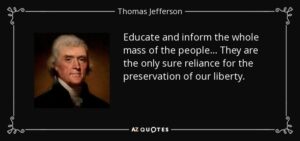
James Madison
I believe there are more instances of the freedom of the people by gradual and silent encroachments by those in power than by violent and sudden usurpations.
The accumulation of all powers, legislative, executive, and judiciary, in the same hands, whether of one, a few, or many, and whether hereditary, self-appointed, or elective, may justly be pronounced the very definition of tyranny. Federalist Papers
Alexander Hamilton or James Madison
In order to lay a due foundation for that separate and distinct exercise of the different powers * of government, which to a certain extent is admitted on all hands to be essential to the preservation of liberty, it is evident that each department * should have a will of its own; and consequently should be so constituted that the members of each should have as little agency as possible in the appointment of the members of the others. Were this principle rigorously adhered to, it would require that all the appointments for the supreme executive, legislative, and judiciary magistracies should be drawn from the same fountain of authority, the people, through channels having no communication whatever with one another. To the People of the State of New York, February 8, 1788.
- branches
Benjamin Franklin
This [American] Constitution…can only end in despotism…when the people shall become so corrupted as to need despotic government, being incapable of any other.

“A republic, if you can keep it.” in response to Elizabeth Willing Powel’s question: “Well, Doctor, what have we got, a republic or a monarchy?”
The public money and public liberty, intended to have been deposited with three branches of magistracy, but found inadvertently to be in the hands of one only, will soon be discovered to be sources of wealth and dominion to those who hold them; distinguished too by this tempting circumstance, that they are the instrument, as well as the object of acquisition. With money we will get men, said Caesar, and with men we will get money. Nor should our assembly be deluded by the integrity of their own purposes, and conclude that these unlimited powers will never be abused, because themselves are not disposed to abuse them. They should look forward to a time, and that not a distant one, when corruption in this, as in the country from which we derive our origin, will have seized the heads of government, and be spread by them through the body of the people; when they will purchase the voices of the people, and make them pay the price. Human nature is the same on every side of the Atlantic, and will be alike influenced by the same causes. The time to guard against corruption and tyranny, is before they shall have gotten hold on us. It is better to keep the wolf out of the fold, than to trust to drawing his teeth and talons after he shall have entered.
Ordaining of laws in favor of one part of the nation to the prejudice and oppression of another is certainly the most erroneous and mistaken policy…An equal dispensation of protection, rights, privileges, and advantages, is what every part is entitled to, and ought to enjoy.
A Bible and a newspaper in every house, a good school in every district–all studied and appreciated as they merit–are the principal support of virtue, morality, and civil liberty.
“Rebellion to tyrants is obedience to God” proposed by Franklin for the motto of the Great Seal of the United States.
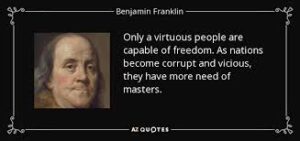
Every man…is, of common right, and by the laws of God, a freeman, and entitled to the free enjoyment of liberty.
Those who would give up essential liberty, to purchase a little temporary safety, deserve neither liberty nor safety.
[F]requent recurrence to fundamental principles…[is] absolutely necessary to preserve the blessings of liberty and keep a government free.
Without freedom of thought there can be no such thing as wisdom; and no such thing as public liberty, without freedom of speech.
Freedom of speech is a principal pillar of a free government; when this support is taken away, the constitution of a free society is dissolved, and tyranny is erected on its ruins. Republics…derive their strength and vigor from a popular examination into the action of the magistrates.
Sell not… liberty to purchase power.
Our new Constitution is now established, and has an appearance that promises permanency; but in this world nothing can be said to be certain, except death and taxes!
God grant that not only the love of liberty but a thorough knowledge of the rights of man may pervade all the nations of the earth, so that a philosopher may set his foot anywhere on its surface and say: This is my country.
Thomas Jefferson
[There is] great confusion about the words democracy, aristocracy, monarchy… Democracy in my sense, where the whole power of the government in the people, whether exercised by themselves or by representatives, chosen by them either mediately or immediately and legally accountable to them… Consequence, the proposed government a representative democracy… Constitution revocable and alterable by the people. This representative democracy as far as is consistent with its genius has all the features of good government.
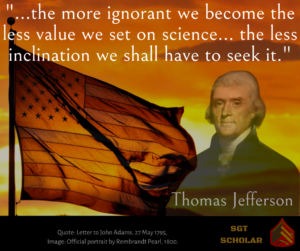
Enlighten the people generally, and tyranny and oppressions of body and mind will vanish like evil spirits at the dawn of the day.” Letter to P. S. du Pont de Nemours, April 24, 1816
I know no safe depository of the ultimate powers of society but the people themselves; and if we think them not enlightened enough to exercise their control with a wholesome discretion, the remedy is not to take it from them, but to inform their discretion by education. Letter to W. C. Jarvis, September 28, 1820
Happy it is when the interest which the government has in the preservation of its own power, coincides with a proper distribution of the public burdens, and tends to guard the least wealthy part of the community from oppression! The Federalist Papers, No. 36, January 8, 1788
John Jay
I consider knowledge to be the soul of a republic, and as the weak and the wicked are generally in alliance, as much care should be taken to diminish the number of the former as of the latter. Education is the way to do this, and nothing should be left undone to afford all ranks of people the means of obtaining a proper degree of it at a cheap and easy rate. to Benjamin Rush, March 21, 1785
James Monrow
I take a deep interest, as a parent and a citizen, in the success of female education, and have been delighted whenever I have been, to witness the attention paid to it. Commenting on Harvard University in “A Narrative of a Tour of Observation,” 1818
John Adams
A government of laws, and not of men. Novanglus Papers, 1774
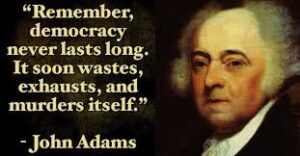 The whole people must take upon themselves the education of the whole people and be willing to bear the expenses of it. There should not be a district of one mile square, without a school in it, not founded by a charitable individual, but maintained at the public expense of the people themselves. September 10, 1785
The whole people must take upon themselves the education of the whole people and be willing to bear the expenses of it. There should not be a district of one mile square, without a school in it, not founded by a charitable individual, but maintained at the public expense of the people themselves. September 10, 1785
Children should be educated and instructed in the principles of freedom. Defense of the Constitution, 1787
Benjamin Rush
Let our common people be compelled by law to give their children (what is commonly called) a good English education. Let schoolmasters of every description be supported in part by the public, and let their principles and morals be subjected to examination before we employ them. … This plan of general education alone will render the American Revolution a blessing to mankind. to Richard Price, May 25, 1786
A few quotations from:
George Washington’s Farewell Address
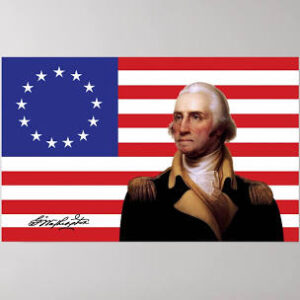 “Promote then, as an object of primary importance, institutions for the general diffusion of knowledge.”
“Promote then, as an object of primary importance, institutions for the general diffusion of knowledge.”
“I shall also carry with me the hope that my country will never cease to view [my errors] with indulgence and that, after forty-five years of my life dedicated to its service with an upright zeal, the faults of incompetent abilities will be consigned to oblivion, as myself must soon be to the mansions of rest.”
“The basis of our political systems is the right of the people to make and to alter their constitutions of government. But the Constitution which at any time exists, until changed by an explicit and authentic act of the whole people, is sacredly obligatory upon all.”
“It is important, likewise, that the habits of thinking in a free Country should inspire caution in those entrusted with its administration, to confine themselves within their respective Constitutional spheres; avoiding in the exercise of the Powers of one department to encroach upon another. The spirit of encroachment tends to consolidate the powers of all the departments in one, and thus to create whatever the form of government, a real despotism. A just estimate of that love of power, and proneness to abuse it, which predominates in the human heart is sufficient to satisfy us of the truth of this position.”
George Washington on Religion and Morality
“Always speak the truth.”
“I now make it my earnest prayer, that God would have the United States in his holy protection, that he would incline the hearts of the Citizens to cultivate a spirit of subordination and obedience to Government, to entertain a brotherly affection and love for one another, for their fellow citizens of the United States at large, and particularly for their brethren who have served in the Field, and finally, that he would most graciously be pleased to dispose us all, to do Justice, to love mercy, and to demean ourselves with that Charity, humility and pacific temper of mind, which were the Characteristicks of the Devine Author of our blessed Religion, and without an humble imitation of whose example in these things, we can never hope to be a happy Nation. Amen. from Washington’s Circular Letter to the States, which he wrote on June 8, 1783 as the commander in chief, at his headquarters in Newburgh, New York. This circular was directed to the governors and states of the new nation. His reference to them has been replaced by the words “the United States.” Otherwise, the words and the spellings are those of General George Washington of the Continental Army.
“I have often expressed my sentiments, that every man, conducting himself as a good citizen, and being accountable to God alone for his religious opinions, ought to be protected in worshipping the Deity according to the dictates of his own conscience.”

“Our Constitution gives to bigotry no sanction.”
“We are persuaded that good Christians will always be good citizens, and that where righteousness prevails among individuals the Nation will be great and happy. Thus while just government protects all in their religious rights, true religion affords to government it’s surest support.”
“”Of all the animosities which have existed among mankind, those which are caused by difference of sentiment in religion appear to be the most inveterate and distressing, and ought most to be deprecated.” in a letter to Sir Edward Newenham on October 20, 1792.
“No people can be bound to acknowledge the invisible hand which conducts the affairs of men more than the people of the united States. Every step by which they have advanced to the character of an independent nation seems to have been distinguished by some token of providential agency.”
“O most glorious God … Direct my thoughts, words and work, wash away my sins in the immaculate blood of the Lamb, and purge my heart by thy Holy Spirit…. Daily frame me more and more into the likeness of thy Son Jesus Christ…. Thou gavest thy Son to die for me, and hast given me assurance of salvation.” written by Washington in the personal prayer book he kept as a young man
Next Week: Sayings of Abba Sisoes
Week after Next: The conclusion of the story of my return from Greece and How Saint Nicholas took charge.
Sources of today’s Post:
https://www.mountvernon.org/george-washington/religion/8-facts-about-george-washington-and-religion
https://billofrightsinstitute.org/founders-quotes
https://ammo.com/articles/founding-fathers-quotes
Library of Congress: https://www.loc.gov/collections/thomas-jefferson-papers/articles-and-essays/selected-quotations-from-the-thomas-jefferson-papers/
Freedom from Religion Foundation https://ffrf.org
https://www.azquotes.com/quotes/topics/us-founding-fathers.html
https://constitutioncenter.org
